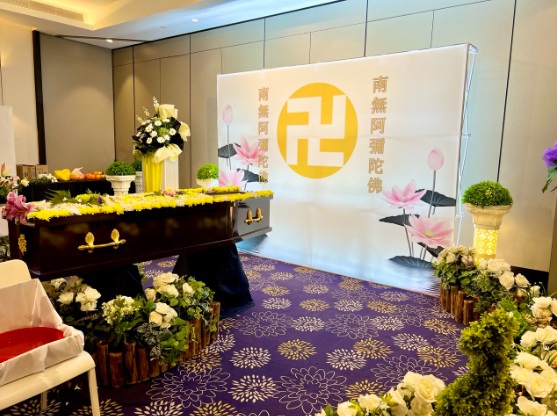Buddhist Funerals are not just a means for the surviving family members to bid farewell to the deceased but is mainly focused on accumulating merits for the deceased to help him or her have a better journey in the afterlife in the hopes of a favourable rebirth.
- Upon Death
Traditionally, the body is left untouched for 6 to 8 hours after the demise and chanting has to be done near the body for this period of time. It is believed that the deceased’s soul is still intact in the body and can hear the chanting. Only after 8 hours, will the body be transferred to the next location, be it an embalming centre for embalming or a funeral parlour to begin the funeral wake. It is not atypical for a sutra blanket with buddhist scriptures to be placed on top of the decedent at this point of time.
- Vigil
In Asia including Singapore, wake set up is usually for odd number of days. This is when the monks or nuns will come and chant sutras. Having more monks or nuns to come pray is believed to help in the transitioning of the soul’s afterlife. Family members can join the prayer sessions and chant sutras which will help in the afterlife of the decedent’s soul.
- Wake Set Up
Flowers are an important part of the wake set up. There will be a photograph and flowers will surround the photograph. For the grander wake set ups there will be a mountain of flowers at the front of the altar table. In recent days, faux flowers are used instead of real flowers to allow the cost of funerals to remain affordable for all and in a bid to be more environmentally friendly. Joss sticks of various sizes will be there and lit continuously. Red candles will also be present.
- Food Offerings
As it is a Buddhist funeral with a Buddha statue present, only vegetarian food should be offered at the funeral wake as a form of respect.
- Post Funeral
It will take some time before the soul moves on the other world and during this period even after the funeral, it is common to get a monk to say some prayers. Prayers are also said and food offered on major milestone dates like the first seventh day, forty-ninth day, hundredth day and subsequently yearly on the death anniversary of the decedent.
Buddhist funerals are deeply spiritual events that blend profound respect for the deceased with a focus on the broader cycles of life and death. They provide solace to the living through the teachings of impermanence and continuity, emphasizing that death is not an end but a transformation.

